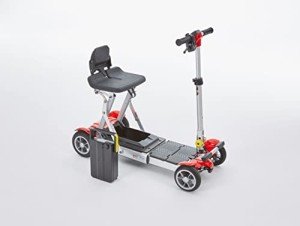How Much Can Lightweight Mobility Scooters Experts Make?
Lightweight Mobility Scooters: A Comprehensive Guide
As the world accepts a more inclusive environment for individuals with mobility challenges, lightweight mobility scooters have become crucial tools to boost independence and mobility. Developed for ease of usage, portability, and an user-friendly experience, these scooters offer a useful service for those who want to browse their environments with very little trouble. In this post, we will check out the features, advantages, and factors to consider associated with selecting the right lightweight mobility scooter.
What Are Lightweight Mobility Scooters?
Lightweight mobility scooters are compact and quickly portable electric scooters developed for people with minimal mobility. They are typically made from lightweight materials such as aluminum and are crafted for ease of disassembly, enabling users to take them on public transport or shop them in small areas. These scooters provide a practical option for running errands, engaging in recreational activities, or simply enjoying a day out.
Key Features of Lightweight Mobility Scooters
Function
Description
Weight
Typically weighs between 30-125 pounds (14-57 kg)
Speed
Optimum speed varies from 4-8 miles per hour (6-13 km/h)
Range
Travel range generally in between 10-15 miles (16-24 km) per charge
Turning Radius
Compact turning radius, normally ranging from 32-54 inches (81-137 cm)
Battery Type
Usually utilizes lead-acid or lithium-ion batteries
Seat Options
Swivel and adjustable seat height for comfort
Mobility
Developed for easy disassembly and transport
Weight Capacity
Varies, generally as much as 300-400 pounds (136-181 kg)
Accessories
Optional devices like baskets, lights, or canopies
Advantages of Using Lightweight Mobility Scooters
Improved Mobility: Lightweight mobility scooters empower users to walk around separately, accessing shops, parks, and leisure areas with ease.
Mobility: The ability to dismantle the scooter or fold it makes it easy to transfer in lorries or public transport.
User-Friendly Design: Most scooters come with instinctive controls, making them available for people of various ages and mobility levels.
Cost-efficient: Compared to larger, heavy-duty scooters, lightweight alternatives are often more economical, making them an appealing option for many users.
Comfort: Many models have adjustable seating and ergonomic styles to improve convenience throughout rides.
Picking the Right Lightweight Mobility Scooter
When considering the purchase of a lightweight mobility scooter, numerous factors need to be examined. Below is a list of factors to consider to keep in mind:
Weight and Portability: Evaluate how easy it is to disassemble or fold the scooter for transportation and check the weight to guarantee you can lift it if needed.
Range and Battery Life: Consider how far you prepare to travel on a single charge and select a scooter that fulfills your day-to-day needs.
Weight Capacity: Select a scooter that easily supports your weight, making sure stability and sturdiness.
Comfort and Features: Look for functions like adjustable seating, footrests, and armrests to guarantee a comfy experience.
Surface Compatibility: Depending on where you plan to utilize the scooter, consider models designed for rugged terrains or primarily for smooth pavements.
Safety Features: Ensure there are important safety functions such as lights, reflectors, and a horn to alert pedestrians.
Popular Lightweight Mobility Scooter Models
Model Name
Weight
Speed
Variety
Weight Limit
Features
Drive Medical Scout
115 pounds
4.25 mph
15 miles
300 pounds
Swivel seat, adjustable armrests, takes apart quickly
Cherokee Mobile
80 lbs
4 mph
10-12 miles
250 lbs
Easy to fold, lightweight, compact style
EV Rider Mini Rider
90 pounds
5 miles per hour
15 miles
300 lbs
Compact style, adjustable tiller, large footrest
Pride Go-Go Elite Traveler
123 lbs
4.5 miles per hour
12.5 miles
300 pounds
4-wheel style, simple disassembly, comfortable seat
Upkeep and Care for Lightweight Mobility Scooters
To lengthen the life of a mobility scooter and maintain its performance, follow these maintenance suggestions:
Regular Cleaning: Keep the scooter clean by cleaning it down frequently and avoiding exposure to water.
Battery Care: Check the battery monthly for proper charge and tidy the terminals to prevent deterioration.
Tire Maintenance: Inspect tire pressure and tread frequently to guarantee a safe ride.
Examinations: Schedule periodic assessments by a qualified specialist for more advanced monitoring of electrical parts.
Frequently asked question Section
1. Are ultra lightweight electric scooters for outdoor usage?
Yes, lots of lightweight mobility scooters are designed for outdoor use, but it's important to inspect the maker's specs for terrain compatibility.
2. How much do lightweight mobility scooters cost?
Costs vary based upon functions and specs, usually varying from ₤ 700 to ₤ 2,500.
3. Does Medicare cover mobility scooters?
Medicare might cover the cost of a mobility scooter under particular conditions. It's best to speak with your doctor and Medicare for particular protection information.
4. Can I take my mobility scooter on an aircraft?
Many airlines allow mobility scooters as checked baggage; however, talk to the specific airline for their guidelines and procedures.
5. The length of time does the battery last on a lightweight mobility scooter?
A totally charged battery typically lasts anywhere from 10 to 15 miles, depending upon the scooter design and user weight.
Lightweight mobility scooters serve as a beacon of independence for those with mobility constraints. With a range of models offered, it's essential to choose one that meets your particular requirements and choices. By comprehending the functions and benefits, users can feel empowered to make informed choices, enhancing their mobility and quality of life. As the industry continues to innovate, the future of lightweight mobility scooters is set to become even more easy to use and encouraging of active way of lives.
